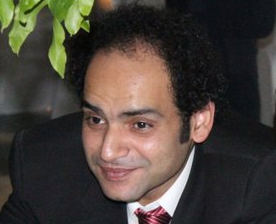
A couple of weeks ago I wrote an article right here on sectarianism in Egypt. The feedback I got was a wave of phone calls and emails all acknowledging the existence of sectarianism. In fact, there are some who called me and expressed their relief that finally we are talking about our sectarian problems without the usual social and political half truths and allusions.
At the same time, right after the events of Abbaseya, there was the incident at a pharmacy where vulgar racial discrimination was practiced shamelessly in the open. In addition, on my way back home from the office last week, I was stopped by a police officer at a checkpoint who gave me a 10 minute moral lecture about the blasphemy I live in for having a tattoo on my right arm!
All these events got me thinking that we do have a serious problem with discrimination here in Egypt. In a more crude sense, we are a racist population, but it’s not necessarily just race. There is this unquestionable discrimination against all those who are different or do not conform to the widely spread morals of society. There is tangible discrimination on a regional and ethnic basis as well. How many candidates were accepted into the Police Academy from Sinai? How many Egyptian Bedouins are there in the judiciary? Let alone, of course, cases where Egyptian society sees fundamental differences, like homosexuality and atheism or agnosticism. In fact, if you go to any public office here in Cairo, you will realise that discrimination is practiced on a social and class-based basis as well. There is always more concern and care for those who look socially and economically well off. My point is that it is about time we take our heads out of the sand and start openly addressing the discrimination that runs rampant in Egypt.
Indeed the most sensitive case of discrimination is that against Egyptian Copts. It is also problematic for one main reason: the lack of objective perspective on the problem. The media either tells you that things are fine and all the clashes happening are for reasons other than discrimination and/or sectarianism, or the other face of the media that tries to tell you Copts in Egypt are on the verge of extinction and what’s happening with them is a new form of apartheid. Of course neither perspective is untrue. Discrimination and sectarianism do exist, but Copts aren’t about to go extinct.
But what we do need to know is that the situation is becoming more serious than we think. Who doesn’t know or hasn’t heard about a Coptic family emigrating to some foreign land lately? I’ve been in taxicabs where the driver has told me how the minority should just obey the laws the majority lays down upon them and be grateful that they are allowed to live here in the first place. And reference was made exclusively to Copts. On the other hand, I’ve seen Copts who believe that there is an organised attack on them by Muslims, or Islamists. It is normal and understandable to find radicals on both sides, those who seek ultimate superiority and those who live in a constant conspiracy theory. While this radicalisation always existed, it is more problematic now for many reasons. There is absolutely no control over those who in the name of religion spread hate speech and commit discriminatory acts. There is also more room being occupied at the moment by Islamic discourse within Egypt’s public sphere. For two years now, Islam has been brought into matters and issues to which it is not related. Finally, Islam now is being used more and more as a term of identity, rather than as a personal relationship between an individual and God.
These factors are making radicalisation more widespread. The real threat is this radicalisation reaching moderate Egyptian Muslims and Copts. It is very dangerous when those who never had a sectarian perspective suddenly start to practice or even accept acts of discrimination. The moderates of Egypt usually have these core beliefs in the basic difference between Muslims and Copts. They do not usually act upon it, but if you dig down deeper, you will find lots of beliefs that are a product of this difference. Sometimes Muslim children are raised on the stereotyping of Copts, while Coptic children at times are raised within a closed ghetto-like society.
But the facts on the ground point to real sources of danger. After all, there is a religious group ruling the country, and this group has not exactly offered assurances that discrimination against Copts will never take place. While there is a lot of empty rhetoric about equality, it is never materialised in law. Until now the President hasn’t been to a church, let alone all the hatred speech being broadcast on religious channels. There is no doubt that there is discrimination against Copts in Egypt, and if nothing is done about it, it will only keep getting worse.
Copts alone should not fight the battle; it is not just religious discrimination that’s at stake, it’s about all other forms of discrimination. Copts are in this battle together with Bedouins, with those who are prevented equal treatment because of their socioeconomic status, and with those who are hunted by society simply because they do not conform to its codes.
The issue is one of citizenship, not one of religious equality. The real struggle is one for a law that bans discrimination, which guarantees equal treatment for all; a law that ensures all Egyptians regardless of their differences are allowed equal access to opportunity. Before it is too late and before we find our society being torn apart by sectarian strife, we need to fight this battle to end discrimination in Egypt.